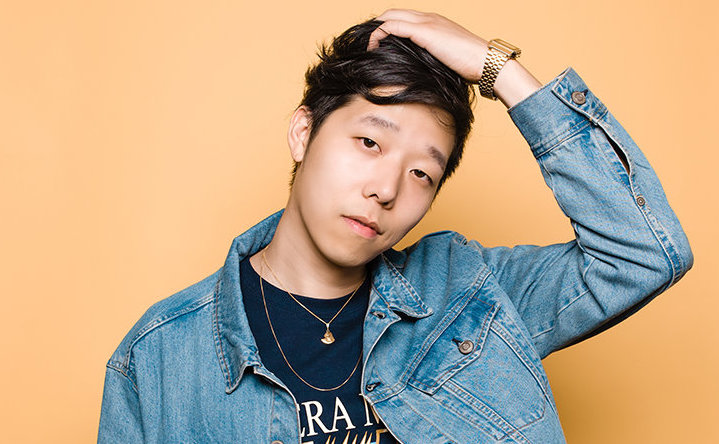Any musical act can talk about growing pains. With each new entry in their discography, a band or artist toils in an endless cycle of experimentation, inadvertently finding what works and what doesn’t. For Charlie Yin—better known by his stage name, Giraffage—some of that experimentation has also involved figuring out what he can still get away with.
From the outset, much of the San Francisco producer’s work involved flipping R&B samples into technicolor bedroom synth pop. Many of Giraffage’s earlier releases owed their success to Yin’s knack for isolating earworm samples and grafting them onto his own chopped and screwed beats. There they would bloom to become the centerpieces of the compositions he built around them.
As he’s watched his star rise, however, San Jose-raised producer has use this technique less and less.
“Being on a bigger label, I’m not really supposed to be sampling too much anymore, just for legal reasons and whatnot. I definitely still snuck a few samples in there,” Yin says. “But now they’re just manipulated to the point where no one can tell where they’re from.”
It’s partly for this reason that his newest full-length—Too Real, released last month—feels like it’s operating on a new sonic plane. Songs that might have featured purple-tinged ’80s and ’90s R&B snippets now trade in carefully chosen guest vocalists and intricate bricklaying.
“Maybes” starts off simply enough. A feathery drum track cradles the breathy vocals of Japanese Breakfast’s Michelle Zauner as she sighs out lyrics cryptically asking if she has what the listener desires.
Each minute seems to present two or four new musical ideas for Giraffage to add to the mix. It’s about three minutes into the track that a punchy collection of dialed-in synthesizers take the stage, rising into a tangled spire of shimmering arpeggios.
When he’s not showing off his new tricks, other songs find the producer illustrating what made many of his early remixes and edits so memorable. His melodies are simple enough to get stuck in your head for a couple days without losing their appeal.
“I think a lot of the music is informed by the stuff I listened to growing up” he says. “I always tended to gravitate towards really sparse melodies. I was never really a huge fan of like jazz, where there’s a ton of notes coming at you all at once. I would usually just connect with more simple and catchy stuff.”
Just 10 seconds into the opening track, “Do U Want Me,” this point is illustrated. The four-note melody pushes forward at breakneck speed a slinky beat that merges live drums with an echoing 808 cowbell. It’s the kind of song that could soundtrack a particularly stoney interstellar voyage or a brisk evening run.
Giraffage’s penchant for simple, slow-building melodies help set his music apart from the cacophony of drop-centric EDM producers that continue to rule YouTube playlists. It’s no surprise, then, to hear that electronic music wasn’t really what first him to making music.
“I think it was Interpol’s Turn on the Bright Lights,” Yin says. “I basically grew up listening to that, and that was one of the albums that inspired me to play drums and guitar initially. I was in bands and stuff in high school and we were basically just trying to be like Interpol knockoffs or The Strokes knockoffs.”
Giraffage says his journey really started when he got tired of having bandmates and opted to start messing around with his own compositions.
There’s no denying that his current output couldn’t be more different from a band like Interpol on the surface. Looking back, though, much of what made songs like “The New,” “Untitled” and “Stella Was a Diver” work in the first place was the foundation laid by Carlos Dengler’s sparse yet vital bass lines.
Yin, who was raised in San Jose, returns for a hometown show at The Ritz this weekend. He’ll be joined by fellow producers Sweater Beats and Wingtip.
Giraffage
Nov 25, 8pm, $30+
The Ritz, San Jose



